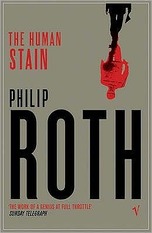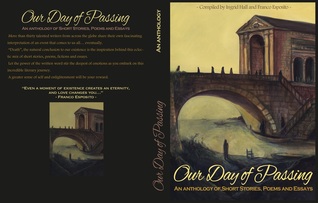| The Day of Our Passing: An Anthologies of Short Stories, Poems and Essays, which yesterday on Amazon reached #1 in the Comparative Religion category and #2 in Reincarnation, is still available for free download through February 23rd. Among its many gems is Chapter 29 from my novel, Student Body. Download it here http://www.amazon.com/dp/B01BQLXBXE?tag=geolinker-20 and enjoy! |
|
0 Comments
 A couple of weeks ago I read Philip Roth’s The Human Stain for a piece of contract work on “place” in literature, so at last I got around to doing a review on Goodreads. Here ’tis: https://www.goodreads.com/review/show/1555242731 ** spoiler alert ** Philip Roth's 2000 The Human Stain is an artful, psychological tale of a Classics professor disgraced by a false accusation of racism, a novel that not only explores the conflicts of race and gender and class but also examines issues of hypocrisy, modern education, and, perhaps most important, the personal construction of "self." After serving as professor at the traditionally ivied Athena College in picturesque rural New England, and then as the Dean who swept out the desiccated academic mummies shambling to class with decades-old lecture notes and replaced them with vigorous new talent, Dr. Coleman Silk planned to spend the last few semesters of his career in a return to teaching. One day, however, when the waggish Silk wonders aloud if two students who still have not appeared by the sixth week of class are merely "spooks," or ghosts, the remark somehow gets back to one of the students, who happens to be African-American, and soon the predictable charges of racism are thrown about until they pile up like kindling and spontaneously ignite. The President who once used Silk as a bulldozer for change is gone, the new Dean, an intellectually and sexually insecure Frenchwoman whom Silk now regrets ever hiring, becomes Silk's chief self-righteous persecutor, and none of his supposed fellow seekers of truth in the ranks of the faculty even attempt to defend him from the contrived accusations. Silk resigns in disgust, and shortly afterward his wife dies of a stroke that he bitterly blames on the scandal. For two years the former academic seethes, writing Spooks, the enraged memoir of the injustices done to him and to his supposedly martyred wife. All of this is the quick background, though, for where Nathan Zuckerman, the professional novelist who narrates the story, really picks up the tale is with the affair the Viagra-reinvigorated 71-year-old man is having with Faunia Farley, the 34-year-old woman serving as janitor at Athena and part-time cleaner of the post office, who also helps with milking at the local dairy farm in exchange for rooming there. Yet not only is Faunia dirt-poor, but she also purports to be illiterate. Thus in addition to the May-December aspect of the relationship at which gossipers might sneer, the suspicious might consider the wealthy, well-educated Silk something of a calculating predator only a half-step up from a rapist. Aside from Lester Farley, Faunia's ex-husband who suffers from post-traumatic stress disorder from the Vietnam War and who sometimes stalks the pair, Silk's friend Zuckerman is the only one who knows about the secret relationship. The secret does come out, of course, and it is no plot spoiler to mention that the secret lovers will be dead only months after the book opens--Zuckerman, after all, clues us into this quite early on, so offhandedly that at first it almost could be missed. That life-and-death part of the plot holds up well, and yet so, too, does the narrative's investigation into the carefully hidden past of Coleman Silk, a curly-haired man apparently of Mediterranean descent, who for decades has identified as "white" and Jewish. Almost no character in the novel is who he or she outwardly appears, however--not Silk, with his origins as a high-achieving "colored" youth of the 1930s and '40s; not Faunia, with her two children killed while she was out cheating on her husband, and the diary that turns up after the supposedly illiterate woman's death; not Delphine Roux, whose hatred of Silk stems as much from her hidden attraction as from her trendy principles; not Herb Keble, the African-American professor hired by Silk long ago, who knows full well of Silk's innocence but does not come forward until too late; not even Zuckerman, intrepid and all-knowing narrator whose control of his own bladder has been robber by surgery for prostate cancer. I would suggest that there is not a single thread in this tangle of characters, motivations, and secrets that fails to intrigue and delight. Roth's style is interesting, too, to readers of patience and open minds; paragraphs sometimes are huge and sentences long enough that sometimes they must be traced back and restarted for full comprehension, and references to Classical mythology are not entirely lacking, shall we say, but all of these things are perfectly appropriate in a "literary" work rather than one of middling, muddling style or lack thereof. Point of view is perhaps even more of an artful puzzle, for while the novel begins with the first-person POV of Zuckerman as author, it soon dips into the secrets of Coleman's boyhood--which very near the end of the book, we learn that Zuckerman does yet even suspect until after the man is buried--and it also dips, in third-person-limited fashion, into the otherwise-unknowable inner lives of both Faunia and Les Farley. How can Zuckerman know these things, when Faunia, whom Zuckeman met only briefly, ends up killed in a car accident, and Les is portrayed as cagily insane? The meeting of Coleman's sister after the funeral explains one track, but for the other two...well, as Zuckerman comments, his job is telling stories, so apparently all the unknowable details of Faunia's and Les's thoughts, at first presented as narrated fact, have been fictionally extrapolated, hypothesized, or--let's face it--simply made up by Zuckerman. This, too, is part of the subtle art here, the final, somewhat surprising result making the supposedly real narrator little different from the godlike third-person-omniscient narrators floating disembodied in the narrative heavens high above other works. In short, The Human Stain--by turns witty, gritty, lyrical, earthy and casually profane, and sorrowfully painful--is a fascinating novel for the reader of discernment as it plumbs the depths of the human mind and the conventions of modern academia and wider society alike. 20 February 2016 |
AuthorAuthor of several dozen pieces of literary criticism, reference entries, and reviews; novel Student Body; memoir Tiger Hunts, Thunder Bay, and Treasure Chests; how-to The Bibliophile's Personal Library; humorous Have You Ever Been to an Irishman's Shanty?; some poetry; and quite a bit of advising/Banner training materials. Archives
May 2024
Categories
All
|

 RSS Feed
RSS Feed
